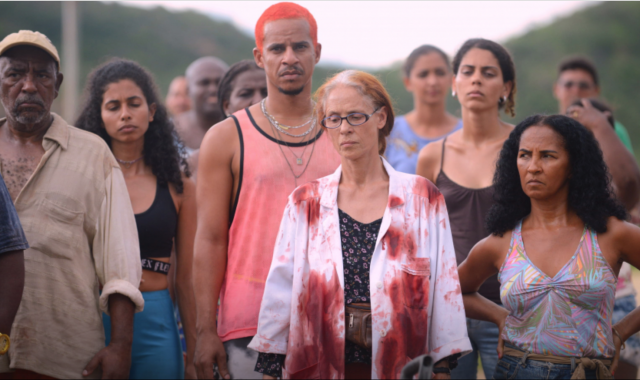Cannes 2019: Bacurau, by Luiz Oliveira

Something threatening hangs over the village of Bacurau, in western Pernambuco. But perhaps no one cares. After all, in the near future, it has been literally erased from the map. When the new film by Kleber Mendonça Filho, this time co-directed by Juliano Dornelles, begins, Teresa (Barbara Colen) has just arrived in the village for the funeral of her grandmother, its matriarch, Carmelita. Reencounters, especially with Pacote (Thomas Aquino), a past and present affair, and with her Father (Wilson Rabelo) form the first act of the plot.
Teresa is the typical prodigal daughter and her return home brings a certain comfort to the small town. As a doctor, she brings enough vaccine doses in her suitcase to inoculate a people completely abandoned by Brazilian politics, except for when the mayor, Tony Filho, shows up to ask for votes while distributing basic goods way past their expiration dates.
Bacurau, the village and the film, is the portrait of a Brazil that survives by its own effort, through the strength and resistance of its people against whatever threatens them. With mysterious deaths on the outskirts of the village and the unexpected loss of any communication signals that include cellphones and TV, the people might need to rely on Lunga, a modern cangaceiro–the term which identifies the centuries old culture of rural banditry in the region. The outlaw is holed up in a dried-up dam.
The film is strong when it explores its Brazilian, especially Northeastern, ambience. Its directors have created societal microcosms from the beginnings of their careers and are therefore experts at portraying the subtle prejudices and the tender bonds of its inhabitants. The introduction of two Southern characters in the plot (Karine Teles and Antonio Saboia) who think they are better and more “white” than the Northeasterners is the scathing satire that the film needs, especially nowadays, when much of the country’s economic elite fantasizes that it is more closely related to Europeans and Americans than their darker-skinned compatriots. By the end, the film evokes a revanchist catharsis that reappropriates a lot of oppressive imagery.
At some point, however, plot takes over from setting and this is where the film falters. Even with extended screen time and care in showing their points of view, the villains remain shallow and cartoonish. The main characters, on the other hand, largely disappear from the screen and their development is rather abruptly halted. The mechanics of a final, violent confrontation certainly tie the film’s themes together but there is considerable cost to a first half that really set it apart from genre cinema.
“Brazil is not for amateurs,” is a popular saying, recited every time outsiders and foreigners look confused about the way things work down there. Bacurau, after all, whose name is a reference to a bird that hunts at night, will not easily surrender to the forces of darkness.


























“when much of the country’s economic elite fantasizes that it is more closely related to Europeans and Americans than their darker-skinned compatriots”
Is that really a fantasy? A study here says that European ancestry averages 60.6% in the northeast (where the film is set) and 77.7% in the south, where those other characters you mention are from.
https://www.gnxp.com/WordPress/2011/02/25/brazilians-more-european-than-not/
Brazilians who self-identify as black actually tend to have nearly as much European ancestry as African, but Brazilians who self-identify as white do indeed tend to have a higher percentage of European ancestry.
There are multiple ways of interpreting your statement, depending on whether we’re just comparing the distances of Brazilians to Europeans or to each other. In the latter case, Bahia would be the one area listed where the percentage of European ancestry among self-identified whites averaged low enough (at 67%) that it was closer to self-identified blacks (reaching a low of 43% at Rio & Rio Grande de Sol and a high of 54% in Bahia) than to 100% Europeans.